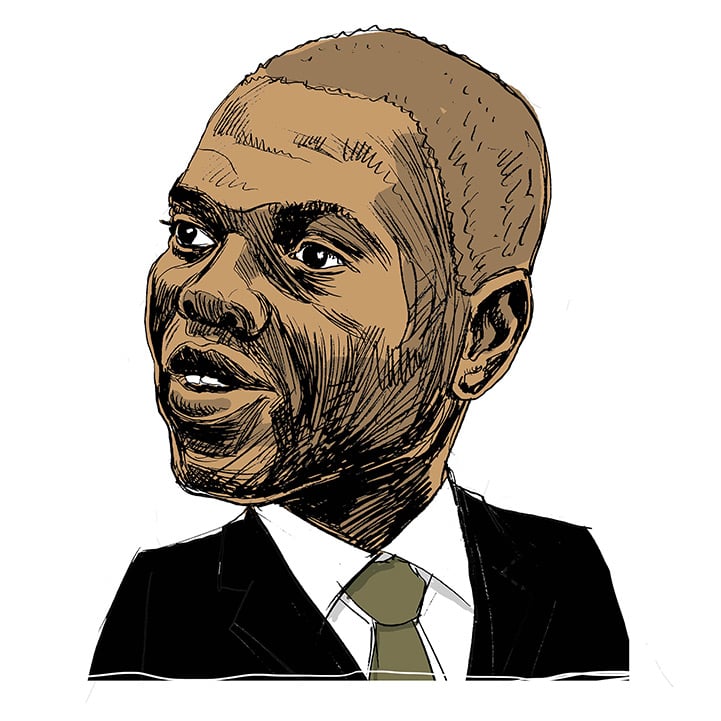When President Cyril Ramaphosa restructured and reshuffled Cabinet in May, it was hoped that he would split justice and correctional services back into two ministries. Instead, he kept them together and handed the huge portfolio to South Africa’s youngest Cabinet member.
But after less than six months in the position, even the sceptics seem to be coming around, saying Lamola has injected new energy into the departments and, although it is too early for conclusive opinions, is making all the right noises.
Lamola says that when he was “on the outside”, he also did not understand the merger of the two departments. But now that he is on the inside, it is the “sensible” approach. His biggest challenge, he says, is to create an integrated justice system, with a seamless “relay” from home affairs, which registers people, through to the police, courts and prisons.
Such a system has been a justice priority for years and is not something easily implemented. Lamola has only been at the helm for seven months. In these seven months, there have been big changes in the justice sector — the appointment of a new national director of public prosecutions, the finalisation of the saga involving former top prosecutors Nomgcobo Jiba and Lawrence Mrwebi, the establishment of Hermione Cronje’s special corruption-busting directorate (known as Scorpions II) and two good appointments to the Constitutional Court. These are not really achievements that can be attributed to Lamola.
But, when the National Prosecuting Authority desperately needed a financial injection, he went to the treasury and got the money. Impressive. He also moved with speed with the regulations that established the Special Investigating Unit Tribunal, which will recover some of the millions that have been lost to the state because of corruption and irregular spending.
Lamola also says he will, in the first quarter of next year, be introducing legislation that will set up permanent land courts. The idea is that these will deal not just with restitution claims, but with redistribution, evictions and evaluations — “everything that is land”. The current Land Claims Court, envisaged when it was created to be a temporary institution, has been crippled by its legislative scheme with long-standing acting appointments. In the meantime, the Judicial Service Commission announced that it would be interviewing for high court judges to second to the Land Claims Court — including in KwaZulu-Natal where, says Lamola, there are many outstanding claims.
Lamola had barely got into his stride when there was the national outpouring of rage against gender-based violence, triggered by the murder of Uyinene Mrwetyana. The criminal justice system came in for some of the harshest criticisms. The Mail & Guardian was almost tempted to give Lamola an F purely based on reports that he had said the Cabinet would reconsider imposing the death penalty. But he says his answer to a question at a press conference was badly reported and taken out of context. Lamola is reassuringly firm that: “It’s not open for debate.” He should have been clearer about the issue.
Regarding building a criminal justice system that works, Lamola is in for the long haul — talking about things that can be achieved in five to 10 years — and remains committed to a rights-based system and one that views prison as a place to rehabilitate people.
He was criticised for his tweet after Kanya Cekeshe, the #FeesMustFall activist jailed for setting a police vehicle alight, was denied bail. Lamola said: “We note the dismissal of both the leave to appeal and bail for Fees Must Fall activist Kanya Cekeshe by the Johannesburg Magistrate’s Court. We’re in the process of urgently assisting him with an application for presidential pardon or other legally available avenues.”
Cekeshe then said he would petition to appeal further, and pardons are only an option when there are no appeals. Lamola says that at the time of the tweet there had been no announcement of an appeal — and “every day” the justice department helps people apply for pardons.
For many, the test for Lamola will be the position the government takes on South Africa’s withdrawal from the International Criminal Court (ICC). This will be a difficult one to navigate because the withdrawal was an ANC resolution, which is supposed to be binding on government. The ICC is an emotive and divisive issue, even in the legal community. Lamola says he “can’t have a personal position” on this issue, because his job is to implement. A parliamentary process is still unfolding, with opportunities for the public to comment. “If the ANC wants to relook at it, we will take it from there,” he says.
With just seven months in office, Lamola has impressed with his energy and determination to get things done and his sober assessment of just how much work there will be.

